Study guides, Class notes & Summaries
Looking for the best study guides, study notes and summaries about ? On this page you'll find 348 study documents about .
Page 4 out of 348 results
Sort by
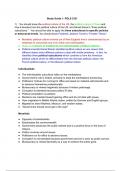
-
Study Guide 1_ POLS 3331
- Class notes • 8 pages • 2024
- Available in package deal
-
- $10.49
- + learn more
Study Guide 1: POLS 3331 This study guide provides key information on various topics related to political culture, powers, electoral devices, local governments, the US highway system, and the duties of different officials. 1) Political Culture: - Understanding the political culture of the US, Texas, and how it deviates from the US political culture. - Daniel Elazar's "three political subcultures" and their application to specific policies and behavioral trends. - Frederick Jackson Tu...
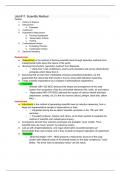
-
Unit #11: Scientific Method
- Class notes • 6 pages • 2024
- Available in package deal
-
- $7.99
- + learn more
Unit #11: Scientific Method - Deductivism and inductivism are methods used in the scientific method. - Deductivism involves deriving scientific laws through deductive methods from metaphysical truths. - Examples of deductivism include Aristotle deducing the shape of the solar system and Hippocrates deducing the causes of mental disorders. - Inductivism involves generating scientific laws through inductive reasoning from observations or data. - Examples of inductivism include Johannes Kepler...
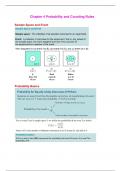
-
Chapter 4 of Probability and Counting Rules
- Class notes • 6 pages • 2024
-
- $7.99
- + learn more
Chapter 4 of Probability and Counting Rules covers the Sample Space and Event, Probability Basics, Basic Properties, Mutually Exclusive Events, Probability Rules, Two Events and Venn Diagram, Contingency Tables, Joint and Marginal Probabilities, Conditional Probability, Multiplication Rule, Counting Rules (Combinatorics), and Binomial Expansion using Pascal's Triangle. An example is given to calculate the probability of a college student not getting the flu if they haven't had a flu shot.
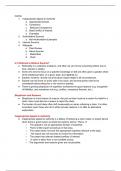
-
Unit #8: Authority and Expertise
- Class notes • 5 pages • 2024
- Available in package deal
-
- $7.99
- + learn more
The text discusses the appropriate use of authority and expertise when evaluating claims. It emphasizes the importance of skepticism and critical thinking when faced with expert advice. The text also highlights the fallacy of inappropriate appeal to authority and provides several criteria for determining whether an appeal to authority is appropriate or not. The text further explains the concept of an appropriate domain of expertise, stating that certain subjective areas like ethics and aesthe...
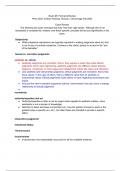
-
Exam #5: Format & Review PHIL 2303: Critical Thinking Thomas J. Brommage Fall 2023
- Class notes • 5 pages • 2024
- Available in package deal
-
- $6.89
- + learn more
Exam #5: Format & Review PHIL 2303: Critical Thinking Thomas J. Brommage Fall 2023 The following concepts are important for the upcoming exam: 1. Subjectivity: While art judgments are subjective, they are not entirely subjective. Beauty is not solely in the "eye of the beholder." 2. Factual vs. Normative Judgments: Aesthetic and ethical judgments are normative, but they use different values. Ethical judgments involve moral blame and praise. 3. Authority/Expertise and Art: Authorit...

-
Chapter 3 (arguments)
- Class notes • 5 pages • 2024
- Available in package deal
-
- $7.99
- + learn more
Arguments are collections of statements that are used to logically support a specific point. They consist of premises, which justify the conclusion, and the logical form that connects the premises to the conclusion. Premises and conclusions are statements that are declarative in grammatical form, factual, and in principle verifiable. Certain words or phrases, known as "tell words," can be used to identify whether a statement is a premise or a conclusion. Common tell words include "therefor...
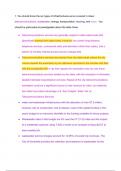
-
Last Test for POLS 3331
- Class notes • 5 pages • 2024
- Available in package deal
-
- $7.99
- + learn more
In class, we covered six types of infrastructure: telecommunications, wastewater, energy, transportation, housing, and water. It's important to focus on the latter three. Telecommunications services are generally subject to state sales taxes, but certain services, such as long-distance telephone services, commercial radio and television, and a portion of monthly internet access service charges, are exempt. City sales taxes on telecommunications services are exempt unless repealed by the city co...
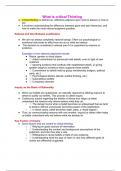
-
Chapters 1,2 (what is critical thinking, The nature of inquiry, The guidlines of inquire)
- Class notes • 5 pages • 2024
-
- $7.99
- + learn more
Critical thinking refers to reflective judgment on what to believe or how to act. It involves recognizing good and bad reasoning and making rational judgments based on evidence. While our psychological and emotional side can influence our beliefs and actions, a rational decision is supported by reasons or evidence. Non-rational judgments include biases, commitment to existing beliefs despite new evidence, ignoring conflicting evidence, and relying on beliefs held by a group or psychological fact...
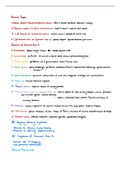
-
Pelvis Review
- Class notes • 26 pages • 2023
- Available in package deal
-
- $7.99
- + learn more
A brief review of the high-yield topics about the pelvis in basic anatomy for medical students. There are detailed descriptions and labeled images to better assist studying. There are also mnemonics, charts, graphs, and color coding to help support the best information retention.
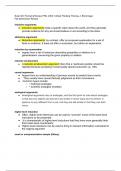
-
Exam #3: Format & Review PHIL 2303: Critical Thinking Thomas J. Brommage Fall 2023 Exam Review
- Class notes • 4 pages • 2024
- Available in package deal
-
- $7.99
- + learn more
The third exam for PHIL 2303: Critical Thinking, taught by Thomas J. Brommage, will cover various topics related to critical thinking. Inductive arguments are claims about the world that provide evidence for why we should believe or act according to the claim. On the other hand, abductive arguments offer proposed explanations for a set of facts or evidence. Induction by enumeration involves generalizing from a set of instances describing properties or relations. Reductio ad absurdum argues again...

That summary you just bought made someone very happy. Also get paid weekly? Sell your study resources on Stuvia! Discover all about earning on Stuvia


